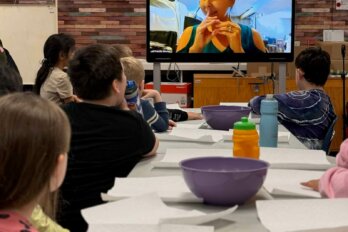Nominees for the 2019 Amazon Canada First Novel Award Youth Short Story category share how they find their voice amid the cacophony of the information age.
For better or worse, the halcyon days of emerging from Waldenesque writer’s retreats with the Great Canadian Novel tucked in one’s briefcase are but a distant memory (yet another debt we owe to Twitter!) For burgeoning authors born on the precipice of the aughts and thereafter, the internet has been an omnipresent source of information—inspirational on good days, and on bad days, sheer noise.
When content is served up on a silver platter, piled high with comments, likes, and the like, is it even possible to craft a truly unique story? Below, this year’s nominees in the Youth Short Story category divulge their go-to sources of creativity.

“It’s true that we live in a different generation now; we constantly have access to information. Some people think of this as a detriment, but I think it’s more of an advantage, because we can connect with other people. I try to draw as much inspiration as possible from the people around me and to turn the mundane things of every day life into something special. The story I wrote stemmed from a concept of a place I didn’t know about and a relationship I’d never had. The main character grew up in a way that I couldn’t imagine, but I tried to in a way that was honest.
“When I first started writing, I was trying so hard to be profound, but I realized that, inside, I’m really insecure. Personally, I don’t try to hide that. Everyone tries to mimic what successful writers have done—to [parrot] their style by taking classes or watching videos or to recreate their storylines with characters close to the ones they’ve written. But what’s really special about this tradition of copying other people’s ideas is that there’s a part of you that still manages to shine through. It’s that failure to completely embody whatever you’re trying to become that ultimately creates a unique story. I don’t even know if what makes a ‘Jenniffer story’ a ‘Jenniffer story.’ I just try to keep things honest.”
—Jenniffer Meng, “Where Do All the Birds Go?”

“A lot of the pieces I create start with a question. I’m one of those people who needs to know how the world works. And I like to play with different outcomes. Like, ‘What would happen if…?” I grew up on books, so what I’ve read has really changed the way I think. That and my parents. In my everyday life, I like to look for things that I think are beautiful—maybe not conventionally so.
“I don’t see the internet as something oppositional to inspiration. You have the world at your fingertips, so there are more places to get inspired from. It allows you to see different kinds of stories—even through dance or music. It’s all a matter of looking at the way other artists create. You know how, in every good book, there’s that moment when the author describes something so perfectly it just washes over you? I take those moments and keep them with me.”
—Zanna Fong, “If Androids Died Like Birds”

“I wouldn’t say I find inspiration anywhere. I know this is a lame answer, but it just comes to me. Generally, I write fairly morbid things, but I’ve had no real experiences with morbid things. I’ve lived a pretty calm life with none of the traumatic events I write about. I have no idea where it comes from—maybe my love of psychological thrillers and gore. I guess I’m just fortunate that I can conjure up that kind of stuff, rather than having to experience it myself.
“Normally, when I write a story, the initial idea usually comes from a phrase. I get something stuck in my head and it builds from there, like a snowball effect. “No. 2 in C Minor” was a bit different: I was at summer camp doing a writing program, and the instructor put a prompt on the board. It was something about being in a locked room with a creepy guy with red eyes who was coming after you. It was supposed to seem kind of like a postapocalyptic [scenario], but for some reason, I reworked it to be about a French guy hallucinating in a restaurant. Fun, right?”
—Sebrina Bank Jorgensen, “No. 2 in C Minor”




